- Solar advice hub
- How-solar-works
- Do solar panels work in winter and on cloudy days?
Do solar panels work in winter and on cloudy days?
How do solar panels cope when it's overcast and cold? Here's how output is affected, and how to help your system.


Why you can trust our content
We know that the solar industry is full of misinformation, but we only use reliable sources, including:
- Our experienced solar experts, installers and system designers
- Our own database of solar & battery system designs
- Authoritative bodies like MCS and the UK government



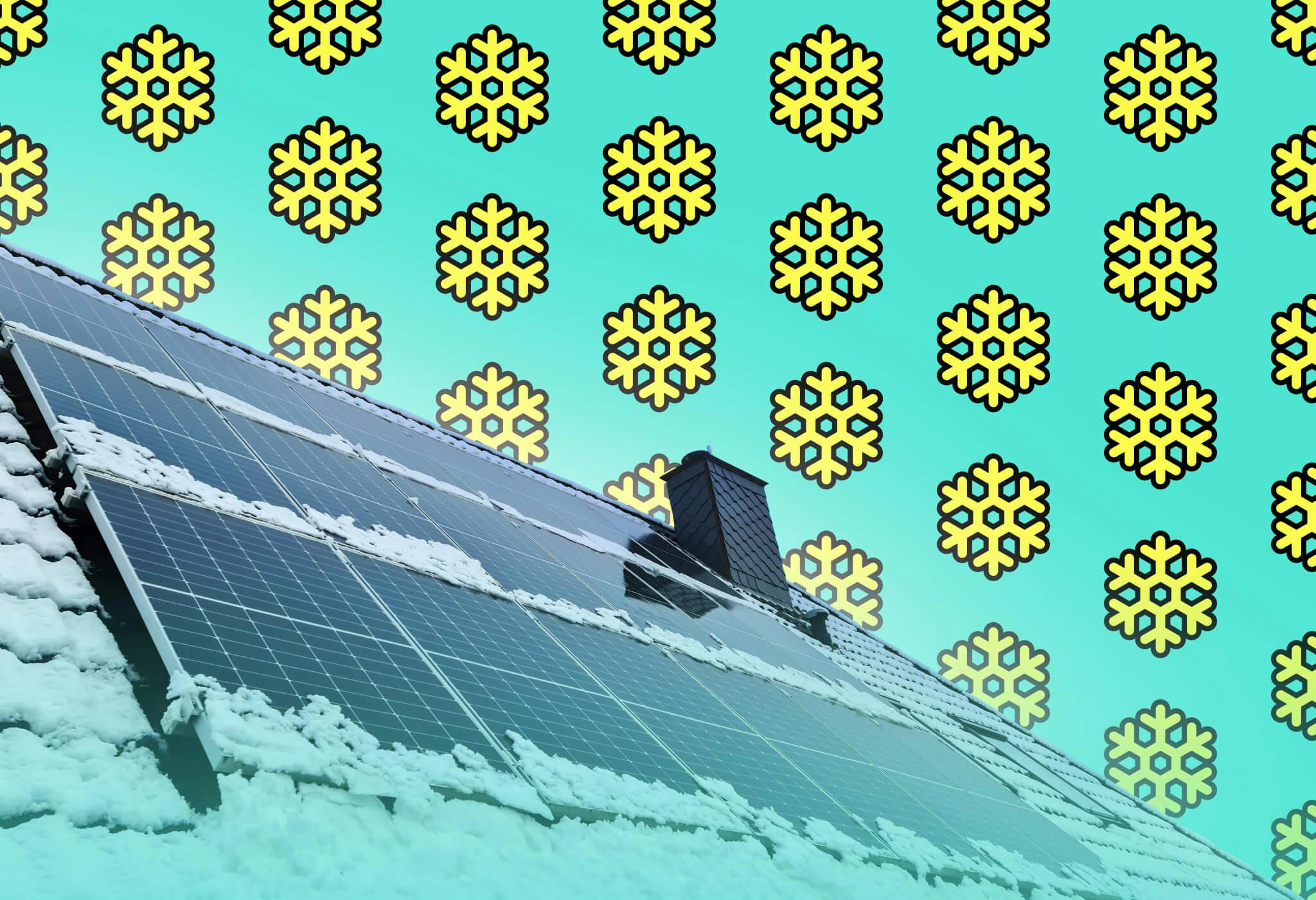
Solar panels in winter & cloud: at a glance
Each year as summer turns to winter, the days get shorter, and the sun is lower in the sky, you may expect solar panels to become pretty redundant.
Thankfully, solar panels continue to work well on less sunshine, even if they don’t produce quite as much electricity as they do on clear summer days.
In this guide, we’ll explain how solar panels cope when the weather’s cloudy and cold, what level of output you can expect, and how to get the best out of your system during these times.
If you'd like to find out how much a solar & battery system could save you on your electricity bills, answer a few quick questions below and we'll generate an estimate for you.
Do solar panels still work in winter?
As solar panels need daylight rather than heat, they can still generate electricity during the frosty season – although they might not be as effective because of a combination of factors associated with winter:
- Winter days are shorter, meaning less daylight for solar panels – so energy production is lower compared to gloriously long summer days
- The sun is lower in the sky during the UK’s winter months, resulting in less direct sunlight reaching the solar panels
- Things like snow, leftover autumn leaves and other debris on the panels can block daylight and reduce their efficiency even further
- If your solar panels aren’t properly sealed, moisture from damp and icy days can seep into the cells and cause damage
But even with these challenges, solar panels are still a viable option for sustainable energy all year round. After all, winter doesn't stop solar panels from producing a decent amount of electricity on clear, sunny days.
And with the high upfront cost of solar panels, you'd be right to expect them to keep working in all weather.
How does winter affect solar panel output?
Your solar panel output will typically be lower in winter.
During these months, the days are shorter and the sun stays lower in the sky – meaning your panels will receive less daylight and less direct sunshine.
However, your solar & battery system will benefit from the colder weather. Like most electrical installations, solar panels work best in cooler temperatures.
Although it seems odd for a device that likes to spend its time basking in sunlight, the electrical resistance of a solar cell decreases in colder weather, which means better electron flow and improved efficiency.
But while chilly weather can improve the efficiency of solar panels, temperature extremes can be harmful – whether that’s very cold or very hot weather.
Solar panel output, winter vs summer
Can solar panels ever get too cold to work?
Although some solar panels can become less efficient if their temperature moves outside the optimum operating temperature (typically between 20°C and 25°C), quality panels are designed to withstand anything from -40°C to 85°C.
Thankfully, our milder UK winters are extremely unlikely to ever push your panels to -40°C or below.
With that being said, extended freezing temperatures could lead to temperature-related degradation that causes slight physical changes in the panels’ materials. Over time, this can lead to permanent damage – though not in the best solar panels.
To learn more about solar, check out our full rundown of the top 17 solar panel facts.
Do you need to buy electricity from the grid during winter?
You’ll almost certainly need to buy electricity from the grid during winter.
Though your solar & battery system will keep generating and storing electricity all year round, there simply isn’t enough daylight during the UK’s colder months to power your home all day.
You can use the grid to fill the gaps – and then from March to October, as the chart below shows, your system will usually go back to producing more electricity than your household uses.
This will allow you to massively cut your electricity bills overall, and with a solar export tariff, you can sell the excess electricity your panels generate to the grid.

This chart is based on a typical four-bedroom family home in Essex using 4,000kWh of electricity per year, with a 6kWp solar panel system and a 5.2kWh battery. The system produces nearly 25kWh of electricity per day in May and July, but only 4.9kWh per day in December.
Can solar panels work in snow?
Solar panels can work extremely well in snow – except if the snow is so heavy that it covers them.
If snow blocks daylight from reaching your panels, it’ll have the same effect as an overhanging tree branch, bird droppings, or any other debris.
In these extremely snowy conditions – which are thankfully rare in the UK – your output will be temporarily reduced, possibly to zero.
To clear your panels, just use a brush head made from foam to avoid damaging the surface.
If you don’t fancy getting involved, you can hire a professional who’ll be glad to shift the snow – or you can leave it to melt on its own.
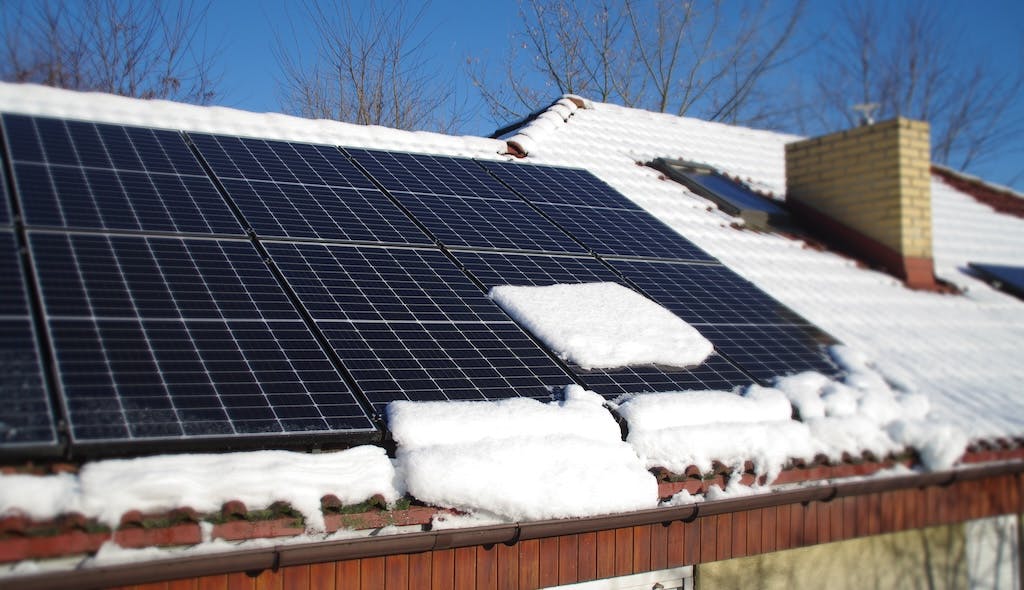
Do solar panels work on cloudy days?
Solar panels continue to generate electricity on cloudy days, as they only require daylight – not sunlight – to function.
When it’s overcast, sunlight hits the clouds and is scattered, becoming what’s known as ‘diffuse sky radiation’.
Around two-thirds of this light still reaches the ground and your solar panels, allowing them to continue producing electricity.
If you can see light, your solar panels will be absorbing it, along with some parts of the light spectrum – like infrared – that you can’t see.
A solar installation will always generate the most electricity in the summer months, when the sun is higher in the sky and you’ll find clearer skies, more sunlight, and longer days – but cloudy days will also save you plenty of money on your electricity bills.
How do clouds affect solar panel output?
Light cloud cover typically reduces solar panel output by 24% when compared to a clear day, according to physicists at Nigeria’s Port Harcourt University.
Under heavy cloud cover, your system will produce 67% less electricity, on average.
So even when clouds start floating into your view, don’t worry. Your panels will still produce between 33% and 76% of the output they usually do – which means lower electricity bills for you.
How does the ‘edge-of-cloud effect’ impact solar output?
The edge-of-cloud effect can temporarily increase solar output.
When sunlight shines through the very edge of a cloud, the water molecules inside the cloud refract and reflect this light, making it more powerful as it passes through.
The edge-of-cloud effect typically causes a 47% spike in solar output when sunlight passes through one cloud, according to researchers at University of California San Diego.
When the light goes through the edges of two clouds, you can expect a 63% increase in solar output, on average.
So if the sky isn’t completely clear, it may be better for your solar panels – because some clouds come with a silver lining.
Solar panel effectiveness: UK vs Europe
Solar panels can certainly generate enough electricity in the UK to help people drastically reduce their energy bills, despite the long winters and regularly cloudy weather.
The chart below shows how solar panel energy yield in the UK compares to that of other countries. This is measured in kWh / kWp, which refers to the quantity of kWh that will be produced from one kWp of solar PV, based on the level of solar irradiance.
You'll notice that there are a couple of European countries that see a smaller yield from solar panels than the UK - and we're also only 124 kWh/kWp behind France.
Summary
Despite the days being shorter, solar panels can still work effectively during winter in the UK, especially on clear days.
We've seen that cold weather can boost output, and though snow can be a bit of a hassle, you can still take full advantage of the winter sunshine with some well-positioned panels and proper care.
So while you may not generate as much electricity, solar panels can still be a worthwhile investment even during the colder months.
If you’re wondering how much a solar & battery system could save you on your electricity bills, answer a few quick questions below and we'll generate an estimate for you.
Solar panels in winter and cloud: FAQs
Related articles
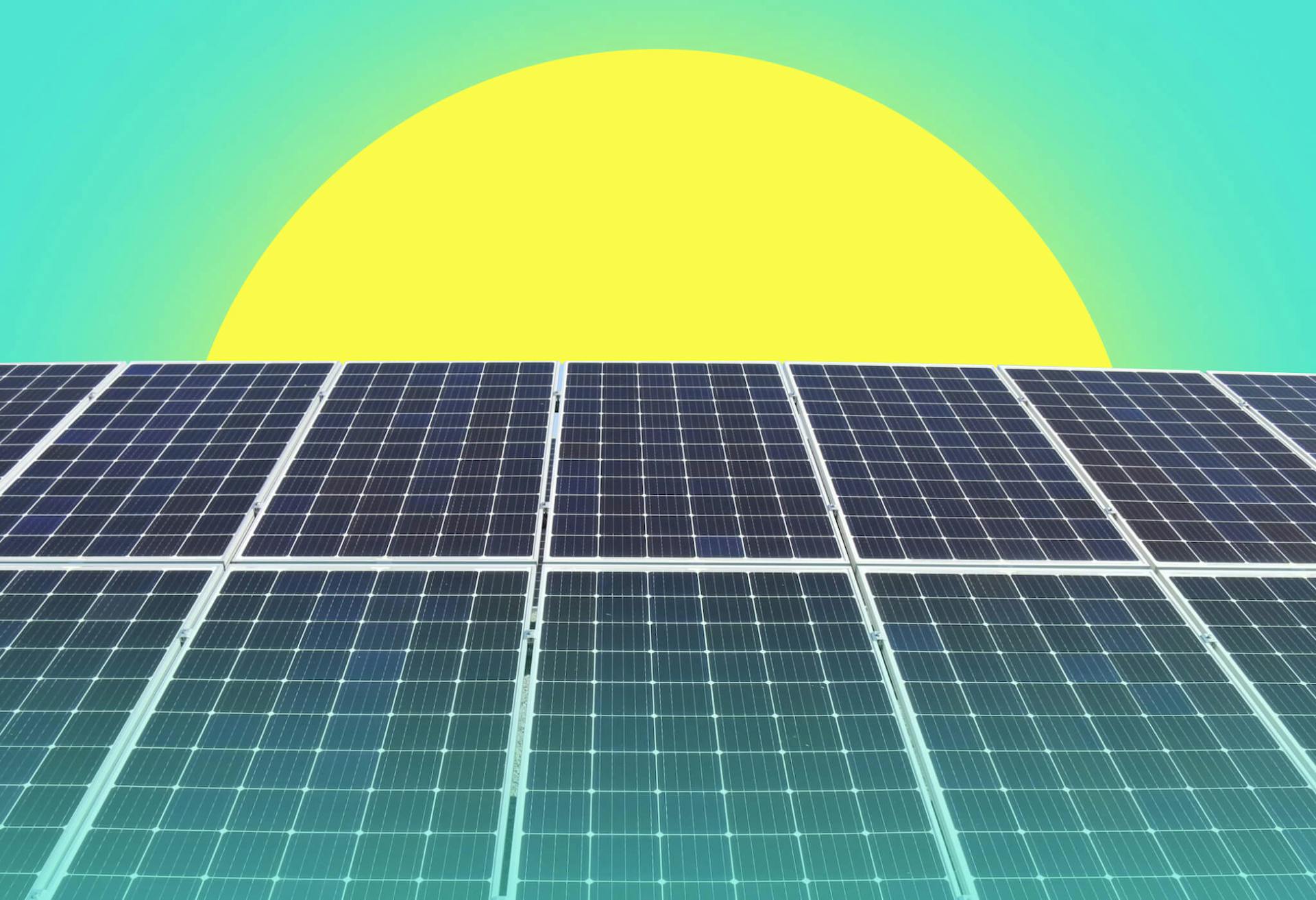
How do solar panels work?
Read full story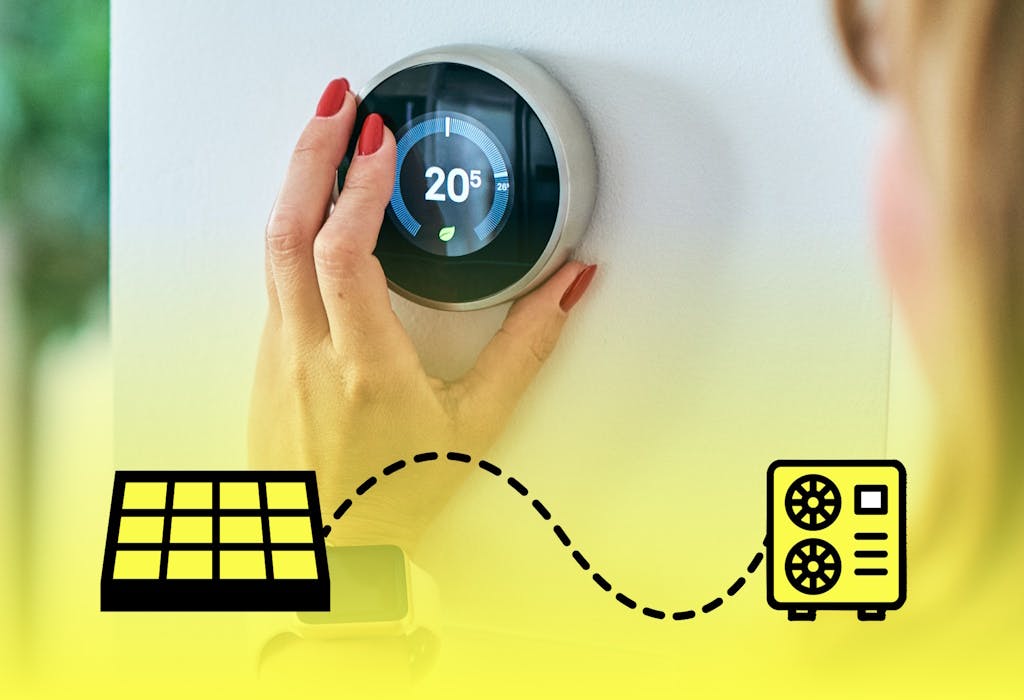
Can solar panels heat a house in the UK?
Read full story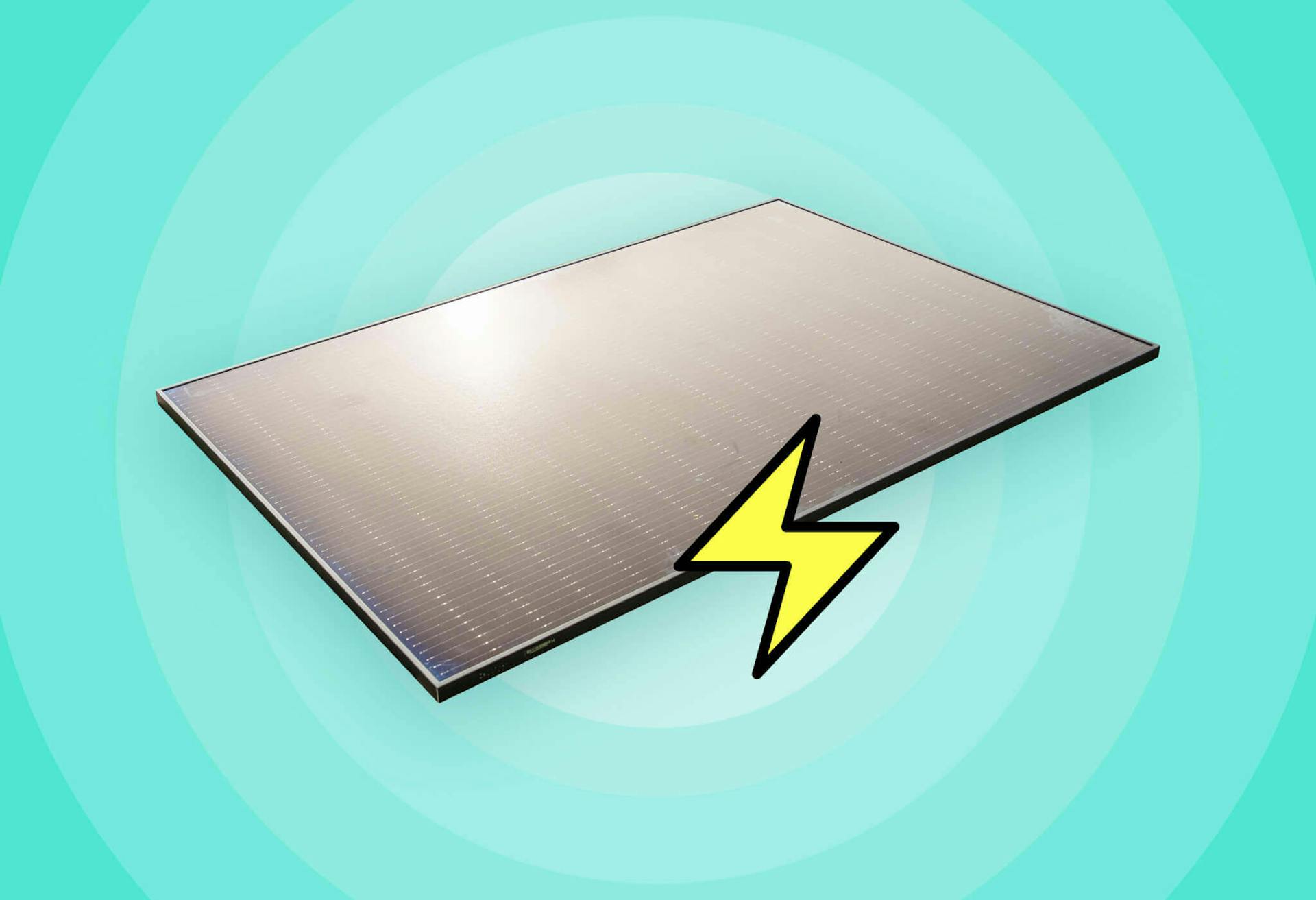
How much energy do solar panels produce?
Read full story
How many solar panels do I need?
Read full story
Written byJosh Jackman
Josh has written about the rapid rise of home solar for the past six years. His data-driven work has been featured in United Nations and World Health Organisation documents, as well as publications including The Eco Experts, Financial Times, The Independent, The Telegraph, The Times, and The Sun. Josh has also been interviewed as a renewables expert on BBC One’s Rip-Off Britain, ITV1’s Tonight show, and BBC Radio 4 and 5.